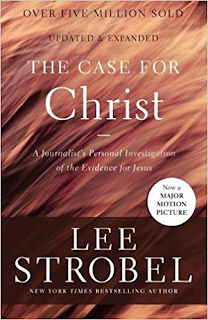Available from Amazon (an Affiliate Link)
I first read "The Case for Christ" during my coming home period, yet in retrospect, I should have read it during my desert wandering, it might have brought me "home" sooner. I tend to be a scientific, logical, rational, left-brained person, probably more so than I should. If something doesn't make sense to me on an intellectual level, I rarely allow it to reach my emotional or heart level.
Lee Strobel and I may have that same "logic trait" in common. Lee has a background in law and journalism - two professions that rarely accept "emotionalism". In the book, "The Case for Christ", Lee talks about his past and how he thought he and his family were happy, even in their atheism. However, when Lee's wife found Christ, it pissed him off. He decided to uncover the folly of Christianity and prove to her, once and for all, that there is no rational reason to believe in Christ.
In "The Case for Christ", Lee approaches his subject with skepticism, determined to look at the foundations of Christianity in such a way as to expose its weaknesses. Yet at every turn, his challenges are rebuffed and the case for Christ stands stronger. Throughout the book, Lee compares his quest to some of his prior journalistic endeavors and shows, that even in the court of law - where reason, rationality, fairness, and justice should prevail, they don't always. Sometimes the wrong person gets sent to prison and then accepts their fate because they don't think anyone will believe the truth.
I confess that, until recently, I made blanket statements like: "the bible is contradictory" or "the bible is only a collection of moral teachings" - both before I had fully read the bible for myself. But I never would have thought to seek an understanding of my belief in the manner that Lee Strobel did.
In Lee's own words:
"In this quest for truth, I've used my experience as a legal affairs journalist to look at numerous categories of proof -- eyewitness evidence, documentary evidence, corroborating evidence, rebuttal evidence, scientific evidence, psychological evidence, circumstantial evidence, and, yes, even fingerprint evidence (that sounds intriguing, doesn't it?)."Lee goes on to say that these classifications are the same that you would experience in a courtroom.
Using these different types of evidence, Lee looks at three aspects:
- The integrity of the written and historical record
- The deity and reality of the man, Jesus
- The resurrection
One thing I think critics would say about Strobel is that he only interviewed believers. However, I would argue that at the time of his initial investigation, he himself was an atheist. Why interview only those who agree with your own position? It is better to force the opposing view to defend its beliefs. I think, in this book, the "opposition" did a good job of defending the case for Christ.
If you have doubts about Christ, if you are curious about why and what you believe, if you're unsure of where you stand, or if you'd like to strengthen your foundation for what you believe, I highly recommend Lee Strobel's "The Case for Christ" as a starting point in your own investigation for truth.
My GoodReads.com rating: 4 stars - ★★★★☆ - "Really liked it."
~~Ken
Title: The Case for Christ
ISBN13: 978-0310345862
Author: Lee Strobel
Genre: Christian non-fictionISBN13: 978-0310345862
DISCLOSURE: Please note that some of the links above are Amazon Affiliate links, and at no additional cost to you, I will earn a commission if you decide to make a purchase after clicking through the link.

No comments:
Post a Comment